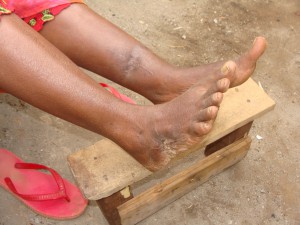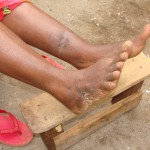NAIROBI, Kenya (Morning Star News) – The Somali convert from Islam and his wife were holding each other under their bed in a Kenyan refugee camp as gunmen outside their door threatened to shoot.
Abukar Mohammed (surname withheld for security reasons), 36, suspected members of Somalia’s Islamic extremist Al Shabaab insurgency who lived in the camp near Dadaab were the ones pounding on the door and demanding he open it the night of April 27. The door was made of wooden poles, and the assailants could see through the gaps between them.
“Come out the door or we will kill you,” one of the assailants said.
“Who are you?” said Abukar, who became a Christian 19 years ago in one of the Dadaab refugee camps some 100 kilometers (62 miles) from the Somali border. “We are not opening the door.”
The attackers called him the Arabic and Somali words for infidel, “Kafir,” and “Gaal” respectively, then said, “We need your head.”
“The killers started shooting at us through the spaces between the poles and hit us on the legs,” Abukar told Morning Star News. “As were lying in great pain, I heard the attackers saying, ‘We have killed the infidels’ as they shot into the air while leaving.”
The couple was later found inside their home in a pool of blood. Two days later they were flown to Nairobi’s Kenyatta National Hospital, where they were treated for two months. They continued treatment at a rehabilitation center on the outskirts of Nairobi, but they are still nursing their injuries, and Abukar’s wife, still in great pain, must use a walking stick.
Abukar, who took on the nickname Ali after his conversion to Christ became known in the predominantly Somali Muslim refugee camp, recalled that the assailants spoke to neighbors outside his home before the assault, asking, “Is this the house of Ali, the Gaal?”
The Muslim operators of the camp could hardly be relied upon for security; indeed, Abukar said Kenyan security personnel assisted the gunmen in the assault.
The experience of this Christian couple – Abukar’s wife also a Somali convert from Islam – is just one example of dangers facing Christians in the Dadaab refugee camps, where an office of the U.N. High Commissioner for Refugees is based. Kenyan officials are increasingly trying to repatriate refugees to Somalia, where the threat of Al Shabaab violence awaits them. The Islamic extremist insurgents have vowed to rid Somalia of its underground Christians.
Abukar is one of many refugees who have spent a large part of their lives in the camps – a generation has known no other existence – and in that time concealing his faith became more difficult. He gained popularity as a distributor of food, some of it from a Christian aid organization, to underground Christian families for six months; he associated with an Ethiopian Christian; and he attended a fellowship run by Christian police in the camp.
He had come to Christ in the camp in 1995 under the influence of Canadian Baptist church workers; his wife (name withheld) converted to Christ in the camp in 2006. Childless, she suffered her third miscarriage while being treated for her wounds from the shooting, she said.
The two said they are in desperate need of help.
“We need medicine and food,” Abukar said. “We thank some few Kenyan Christians who once in a while come and see us.”
Another Somali convert from Islam, 48-year-old Abdikadir (surname withheld), saw Muslim relatives and other Somalis burn his home down in one of the undisclosed Dadaab refugee camps in April. He told Morning Star News that they took away his wife and four children in the course of destroying his home.
Like Abukar and his wife, Abdikadir is also a UNHCR-designated refugee; he managed to escape the attack in the camp and is now in hiding elsewhere. He came to Christ while still living in Somalia, and in Kenya his boldness in proclaiming Christ landed him in a Khadi (Islamic) civil court in Garissa under a charge of leaving Islam on March 22, 2013, he said.
“I could not deny my faith in Christ,” he said. “I stood firm with my conviction that Jesus is my Lord and Savior,” he said.
He escaped retribution, but he and other Somali underground Christians in Kenya live in constant fear of Kenya’s repatriation efforts.
“We appeal to the churches in Kenya to protect us and speak of our situation, lest we are taken back to Somalia only to be killed as we try to provide for our basic needs,” he said. “We also appeal to international community to give us asylum abroad.”
If you or your organization would like to help enable Morning Star News to continue raising awareness of persecuted Christians worldwide with original-content reporting, please consider collaborating at https://morningstarnews.org/donate/?
###
© 2014 Morning Star News. Articles/photos may be reprinted with credit to Morning Star News.
Morning Star News is a 501(c)(3) non-profit corporation that relies solely on contributions to offer original news reports of persecuted Christians. By providing reliable news on the suffering church, Morning Star News’ mission is to empower those in the free world to help and to encourage persecuted Christians that they are not forgotten or alone. For free subscription or to make tax-deductible donations, contact [email protected], or send check to Morning Star News, 24310 Moulton Parkway, Suite O # 157, Laguna Hills, CA 92637, USA.
- Scars on Abukar’s wife after Islamic extremist attack. (Morning Star News)


